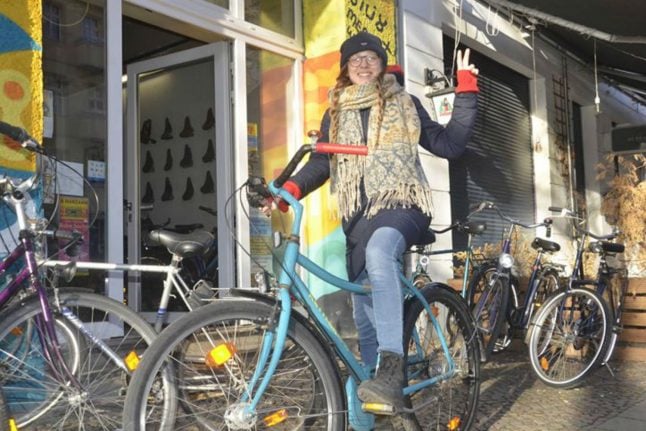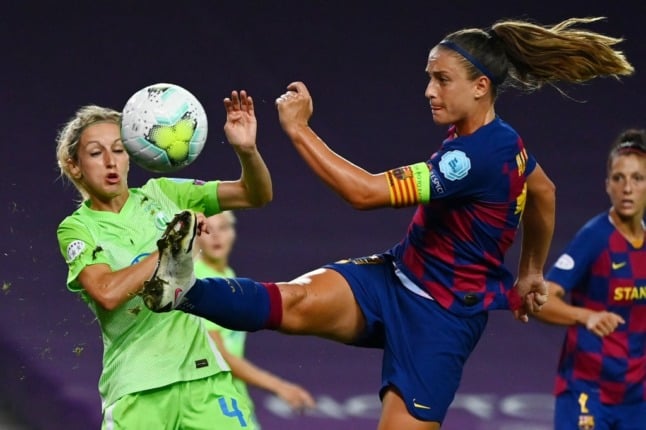On the first International Women’s Day (IWD) celebrated as a public holiday in Berlin for the first time ever, one bike shop slashed prices to bring attention to the gender wage gap – an issue not only unresolved but commonly misunderstood in Germany.
SEE ALSO: Where to celebrate Women's Day in Berlin
In the hip neighbourhood of Friedrichshain in former east Berlin, Bikeopia bike shop offered women a 10 percent discount on everything in-store between February 21st and March 9th.
It’s “a small gesture to address a big problem”, say owners Maurice Hawkesworth and Eugenio Troia, referring to Germany’s yet-unresolved gender pay gap. Losing 10% of their turnover through the experiment, the discount is, they say, designed to make them “feel for a short period what it’s like to get 10% less”.

One of Bikeopia's customers benefitting from the discount. Photo: mmh
Behind the pay gap
In actuality, even 10% doesn’t quite match the real size of the pay gap in Germany. Last year, the Federal Statistics Office reported that women were paid 21% less than men in 2017, showing little progress from the year before. It’s a figure that puts Germany second only to the United Kingdom in Europe for having the worst gender pay disparity.
What makes the issue so interesting in Germany is that few – local or otherwise – seem to realize the severity or scale of the problem. Hawkesworth and Troia both told The Local, for instance, that the idea for their bike shop sale sprung from a dispute they had over the existence of the pay gap.
“We immediately turned to the arbitrator of all our bike shop disputes: Google…To our surprise, [we found that] Germany’s pay gap is one of the highest in Europe,” said Hawkesworth.
Though they say the reaction to the sale has been overwhelmingly positive, both men claim that when “we told our women customers when they were paying about the rebate many of them had no idea [about the pay gap],” said Troia.
This discrepancy between perception and reality exists in part because of Germany’s image as a forward-thinking, progressive country. Especially to those looking in from other developed nations like the UK and the USA, Germany’s generous maternity leave, welfare benefits and long-time female head of state project the appearance of a nation in step – or even ahead – of the times.

Graph created for The Local by Statista.
A 'mediocre' performance
Take a closer look at social attitudes and real figures, however, and this idea quickly unravels. A 2015 report from the European Parliament, for instance, rated Germany’s performance in achieving gender equality as “mediocre” in comparison to other EU member states, pointing to a lack of effective equality policies, re-traditionalizing family policies and the gender pay gap as some of the main issues.
Since that report, a 2016 law requiring large companies to appoint at least 30 percent women to their supervisory boards and a 2017 “Wage Transparency Act” have both been passed – but success has been limited.
SEE ALSO: Why these women say wage transparency isn't enough
Just last year, the German Institute for Economic Research found that there’s been virtually no progress on getting more women onto German boards, while campaigners argue that the Wage Transparency Act places too much onus on individuals to request information on wage discrepancies.
What’s more, regressive social attitudes about gender still linger in Germany, particularly in relation to “women’s work” or “Frauenberufe”; a term still commonly used to refer to lower-paid careers like nursing or hairdressing.
It’s stereotypes like these, in part, that push women to towards lower-paid, insecure work, while men take jobs higher up the pay scale.
Tackling misconceptions about career choice
It’s with this discrepancy in the kind of careers women and men “choose” that another kind of misunderstanding about the pay gap in Germany emerges: that the gender pay gap exists because women are simply being paid less than men for the exact same work.
Yet when Germany’s pay gap is “adjusted” to compare men and women with comparable qualifications in comparable jobs, it stands at just 6%.

Customers browsing at Bikeopia. Photo: mmh
While some use this figure to discredit the severity of the pay gap, this data more tellingly reveals the complexity of the pay gap, which isn’t simply a product of straightforward discrimination but a society in which sexism is experienced at every level, driving women’s and men’s choices from an early age.
In Germany, for instance, women tend to study more traditionally “feminine” subjects in the social sciences and humanities, whereas men tend to study more “masculine” subjects in the hard sciences, leading to lower-paid jobs and lifetime earnings for women.
Because social attitudes still dictate that women should bear responsibility for childcare, fewer women than men are in the workforce overall, and lacking kita provisions often lead to new mothers reducing their hours or dropping out of work. Interestingly enough, in East Germany, where women were more likely to work during the GDR era, the pay gap is still – even today – far smaller than in the west.
A slow shift
It’s clear that Germany’s approach to solving the gender pay gap must be multi-faceted, focusing not only on policy alone but social attitudes too.
With this year’s first public holiday to celebrate IWD and shops like Bikeopia acknowledging the issue, it seems things might finally be shifting – even if progress is slow.
And while Hawkesworth and Troia recognize that their sale alone won’t solve this complex issue, they “do recommend it to people who want to know how it feels to make 10% less even if it’s only for a short period of time”.
As their experiment draws to a close, they conclude that “there is hope in the world because even the youngest of our clients seemed almost puzzled by the idea of a gender pay gap, [coming into the shop and commenting] “What, there’s a gender pay gap? That’s ridiculous!”




 Please whitelist us to continue reading.
Please whitelist us to continue reading.
Member comments